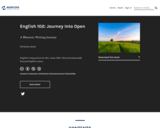
English Composition for Mrs. Jones ENG 102 environmentally focused English course.
- Subject:
- English Language Arts
- Material Type:
- Textbook
- Provider:
- Maricopa Open Digital Press
- Author:
- Christine Jones
- Date Added:
- 08/29/2021


English Composition for Mrs. Jones ENG 102 environmentally focused English course.
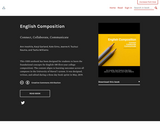
Connect, Collaborate, Communicate
Short Description:
This OER textbook has been designed for students to learn the foundational concepts for English 100 (first-year college composition). The content aligns to learning outcomes across all campuses in the University of Hawai'i system. It was designed, written, and edited during a three day book sprint in May, 2019.
Word Count: 32252
ISBN: 978-1-948027-07-6
(Note: This resource's metadata has been created automatically by reformatting and/or combining the information that the author initially provided as part of a bulk import process.)
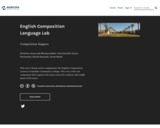
This text is being used to supplement the English Composition Course at Glendale Community College. This text is the Lab component that supports the main course for students who might need a little more.
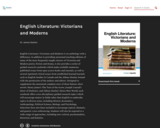
Short Description:
English Literature: Victorians and Moderns is an anthology with a difference. In addition to providing annotated teaching editions of many of the most frequently-taught classics of Victorian and Modern poetry, fiction and drama, it also provides a series of guided research casebooks which make available numerous published essays from open access books and journals, as well as several reprinted critical essays from established learned journals such as English Studies in Canada and the Aldous Huxley Annual with the permission of the authors and editors. Designed to supplement the annotated complete texts of three famous short novels: Henry James’s The Turn of the Screw, Joseph Conrad’s Heart of Darkness, and Aldous Huxley’s Brave New World, each casebook offers cross-disciplinary guided research topics which will encourage majors in fields other than English to undertake topics in diverse areas, including History, Economics, Anthropology, Political Science, Biology, and Psychology. Selections have also been included to encourage topical, thematic, and generic cross-referencing. Students will also be exposed to a wide-range of approaches, including new-critical, psychoanalytic, historical, and feminist.
Long Description:
English Literature: Victorians and Moderns is an anthology with a difference. In addition to providing annotated teaching editions of many of the most frequently-taught classics of Victorian and Modern poetry, fiction and drama, it also provides a series of guided research casebooks which make available numerous published essays from open access books and journals, as well as several reprinted critical essays from established learned journals such as English Studies in Canada and the Aldous Huxley Annual with the permission of the authors and editors. Designed to supplement the annotated complete texts of three famous short novels: Henry James’s The Turn of the Screw, Joseph Conrad’s Heart of Darkness, and Aldous Huxley’s Brave New World, each casebook offers cross-disciplinary guided research topics which will encourage majors in fields other than English to undertake topics in diverse areas, including History, Economics, Anthropology, Political Science, Biology, and Psychology. Selections have also been included to encourage topical, thematic, and generic cross-referencing. Students will also be exposed to a wide-range of approaches, including new-critical, psychoanalytic, historical, and feminist.
In addition, each selection is accompanied by a variety of study questions and stable internet links to enriching dramatic adaptations, as well as broadcast discussions of selected works and authors. Some of the units afford students the opportunity to explore archival documents and to use them in their own research.
Finally, the opentext contains 3 practical appendices: a glossary of literary terms, detailed instruction in writing about literature; and thorough guidance in documenting the research paper in accordance with current MLA guidelines.
Word Count: 460279
ISBN: 978-1-989623-65-7
(Note: This resource's metadata has been created automatically by reformatting and/or combining the information that the author initially provided as part of a bulk import process.)
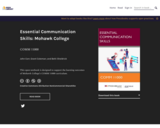
COMM 11000
Short Description:
This open textbook supports the learning outcomes of Mohawk College’s COMM 11000 curriculum as they relate to communications for academic and professional purposes.
Long Description:
This open textbook is designed to support the learning outcomes of Mohawk College’s COMM 11000 curriculum. It foregrounds a problem-solving approach to writing and other communications practice. It is designed to guide college students in developing the vital skills that will help with the real, everyday experience of writing and speaking. Organized in five major units—Communication as Problem-Solving, Professional Writing Processes, Routine Workplace Communication, Employment and Interpersonal Communication, and Presentations and Group Communication —this opened educational resource is presented in a variety of AODA-compliant formats. Structured around the learning outcomes of Mohawk College’s core Communication course, this textbook helps ensure that students feel comfortable with the communication skills necessary to succeed in classrooms and places of work.
Word Count: 200251
(Note: This resource's metadata has been created automatically by reformatting and/or combining the information that the author initially provided as part of a bulk import process.)
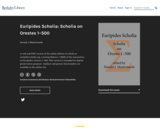
Short Description:
A web and PDF version of the online edition of scholia at euripidesscholia.org, covering Release 1 (2020) of the annotations on Euripides, Orestes 1–500. This version is intended for digital preservation purposes. Updates and greater functionality are available at the online site.
Long Description:
Scholia are the annotations found in medieval manuscripts of Greek authors. They are found in the margins and between the lines of a primary text, or occasionally gathered in a separate codex or section of a codex. The annotations represent an amalgamation of commentary and glosses made over a long period of time, from the 2nd century BCE to the Renaissance, and designed for a wide spectrum of users, from professional scholars and advanced teachers to learners using the primary text as a means of learning classical Greek vocabulary, grammar, and style. This edition is part of a long-term, open-ended project to provide a more extensive accounting of the annotations on the tragedies of Euripides than ever before. This book provides an edition of the prefatory material (argumenta) and scholia on the first 500 lines of Orestes: about 9000 items drawn from over 30 manuscripts. This is eBook version of the online edition of scholia at EuripidesScholia.org, covering Release 1 (2020) with the annotations on Euripides, Orestes 1–500. This version is intended for digital preservation purposes. Updates and greater functionality are available at the online site.
Word Count: 288401
ISBN: 978-0-9997970-2-0
(Note: This resource's metadata has been created automatically by reformatting and/or combining the information that the author initially provided as part of a bulk import process.)
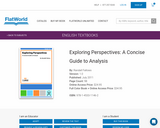
The reason why Randall Fallows wrote Exploring Perspectives: A Concise Guide to Analysis is simple; to help give students a better understanding of how to discover, develop, and revise an analytical essay. Here is how his 5 chapter book goes about doing just that:The first two chapters focus on the nature of an analysis and what’s involved in writing an analytical essay. First, Randall shows that analysis consists of a balance of assertions (statements which present their viewpoints or launch an exploration of their concerns), examples (specific passages/scenes/events which inspire these views), explanations (statements that reveal how the examples support the assertions), and significance (statements which reveal the importance of their study to personal and/or cultural issues).After showing why each feature should be present throughout an essay, he reveals how to ”set the stage“ for producing one of their own. He first helps students to evaluate their own views on a subject and to examine how these views emerge from their own experiences, values and judgments. He, then, shows them how to research what others have said about the subject and provides suggestions for evaluating and incorporating this research into their own perspectives.Finally, Randall discusses the nature of writing, not as a linear procedure, but as a recursive process where the discovery and clarification of a concept occur simultaneously.The remaining three chapters reveal more specific advice on how to develop an analytical essay.Exploring Perspectives: A Concise Guide to Analysis by Randall Fallows is a great text to prepare any student to write analytical essays for the argument and persuasion courses.
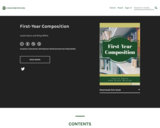
Word Count: 27595
(Note: This resource's metadata has been created automatically by reformatting and/or combining the information that the author initially provided as part of a bulk import process.)
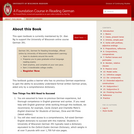
Short Description:
This textbook guides a learner who has no previous German experience to gain the ability to accurately understand formal written German prose, aided only by a comprehensive dictionary.
Word Count: 35928
(Note: This resource's metadata has been created automatically by reformatting and/or combining the information that the author initially provided as part of a bulk import process.)
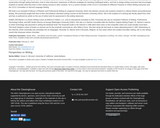
Foundational Practices of Online Writing Instruction, edited by Beth L. Hewett and Kevin Eric DePew, with associate editors Elif Guler and Robbin Zeff Warner, addresses the questions and decisions that administrators and instructors most need to consider when developing online writing programs and courses. Written by experts in the field (members of the Conference on College Composition and Communication Committee for Effective Practices in OWI and other experts and stakeholders), the contributors to this collection explain the foundations of the recently published (2013) A Position Statement of Principles and Examples Effective Practices for OWI and provide illustrative practical applications. To that end, in every chapter, the authors address issues of inclusive and accessible writing instruction (based upon physical and mental disability, linguistic ability, and socioeconomic challenges) in technology enhanced settings.
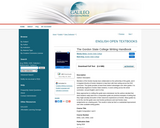
Members of the Gordon faculty have collaborated on the authorship of this guide, and it is targeted directly at Gordon students to help them with their writing across the GSC curriculum. This guide provides at least three distinct advantages over other guides: it is specifically targeted to Gordon State students, it covers writing across the whole curriculum, not just English; and it is free.
Many approaches to crafting this guide were entertained, but the authors decided that what students really want from a composition guide are practical examples of writing that they might actually encounter in their classroom experiences at Gordon. Many guides try to do this, but this guide uses real Gordon professors and real Gordon class assignments as a starting point. This results in what we feel is a substantial improvement over other available writing guides.
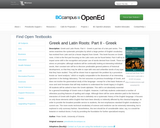
Greek and Latin Roots: Part II - Greek is part two of a two part series. This series examines the systematic principles by which a large portion of English vocabulary has evolved from Latin and (to a lesser degree) from Greek. This book focuses on Greek roots. A link to the first part focusing on the Latin roots can be found below. Part II will try to impart some skill in the recognition and proper use of words derived from Greek. There is a stress on principles: although students will be continually looking at interesting individual words, their constant aim will be to discover predictable general patterns of historical development, so that they may be able to cope with new and unfamiliar words of any type that they have studied. They will be shown how to approach the problem by a procedure known as “word analysis,” which is roughly comparable to the dissection of an interesting specimen in the biology laboratory. The text assumes no previous knowledge of Greek, and does not involve the grammatical study of this language—except for a few basic features of noun and verb formation that will help students to understand the Greek legacy in English. All students will be asked to learn the Greek alphabet. This skill is not absolutely essential for a general knowledge of Greek roots in English. However, it will help students understand a number of otherwise puzzling features of spelling and usage. Although there will be some attention paid to the historical interaction of Greek with English, this text is definitely not a systematic history of the English language. It focuses on only those elements within English that have been directly or indirectly affected by this classical language. In order to provide the broadest possible service to students, the text emphasizes standard English vocabulary in current use. The more exotic technical vocabulary of science and medicine can be extremely interesting, but is explored in only summary fashion. Nevertheless, this text should be of considerable value, say, to a would-be botanist or medical doctor, if only by providing the foundation for further specialized enquiry.
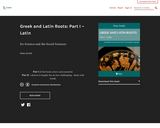
Greek and Latin Roots: Part I - Latin is part one of a two part series. This series examines the systematic principles by which a large portion of English vocabulary has evolved from Latin and (to a lesser degree) from Greek. This book focuses on Latin roots. A link to the second part focusing on the Greek roots can be found below. Part I will try to impart some skill in the recognition and proper use of words derived from Latin. There is a stress on principles: although students will be continually looking at interesting individual words, their constant aim will be to discover predictable general patterns of historical development, so that they may be able to cope with new and unfamiliar words of any type that they have studied. They will be shown how to approach the problem by a procedure known as “word analysis,” which is roughly comparable to the dissection of an interesting specimen in the biology laboratory. The text assumes no previous knowledge of Latin, and does not involve the grammatical study of this language—except for a few basic features of noun and verb formation that will help students to understand the Latin legacy in English. Although there will be some attention paid to the historical interaction of Latin with English, this text is definitely not a systematic history of the English language. It focuses on only those elements within English that have been directly or indirectly affected by this classical language. In order to provide the broadest possible service to students, the text emphasizes standard English vocabulary in current use. The more exotic technical vocabulary of science and medicine can be extremely interesting, but is explored in only summary fashion. Nevertheless, this text should be of considerable value, say, to a would-be botanist or medical doctor, if only by providing the foundation for further specialized enquiry.
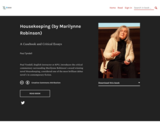
A Casebook and Critical Essays
Short Description:
Paul Tyndall, English instructor at KPU, introduces the critical commentary surrounding Marilynne Robinson's award winning novel Housekeeping, considered one of the most brilliant debut novel's in contemporary fiction.
Word Count: 8907
(Note: This resource's metadata has been created automatically by reformatting and/or combining the information that the author initially provided as part of a bulk import process.)
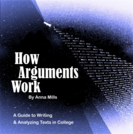
How Arguments Work takes students through the techniques they will need to respond to readings and make sophisticated arguments in any college class. This is a practical guide to argumentation with strategies and templates for the kinds of assignments students will commonly encounter. It covers rhetorical concepts in everyday language and explores how arguments can build trust and move readers.
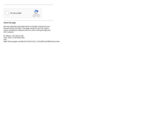
Technical writing courses introduce you to some of the most important aspects of writing in the worlds of science, technology, and business—in other words, the kind of writing that scientists, nurses, doctors, computer specialists, government officials, engineers, and other professionals do as a part of their regular work. The skills learned in technical writing courses can be useful in other fields as well, including education and social sciences.
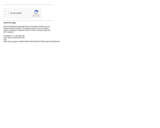
Welcome to composition and rhetoric! While most of you are taking this course because it is required, we hope that all of you will leave with more confidence in your reading, writing, researching, and speaking abilities as these are all elements of freshman composition. Many times, these elements are presented in excellent textbooks written by top scholars. While the collaborators of this particular textbook respect and value those textbooks available from publishers, we have been concerned with disenfranchising students who do not have the resources to purchase textbooks. Therefore, we decided to put together this Open Educational Resource (OER) explicitly for use in freshman composition courses at Texas A&M University. Thanks to a generous grant from Dean David Carlson of the Texas A&M University Libraries, this project became a reality. It is a collaborative endeavor undertaken by faculty in the libraries and English Department as part of the Provost’s Student Success Initiatives at Texas A&M and continues to be a work in progress. Combined, Dr. Terri Pantuso, Dr. Kathy Anders, and Prof. Sarah LeMire have over 30 years of experience in writing and research instruction. Our goal is for students to leave this course as critical thinkers, polished writers, and informed citizens who can engage in civil public discourse. Gig ‘em, Ags!

The focus of the text is on interacting in various ways with academic sources and popular articles, including paraphrasing, summarizing, responding to arguments, and using sources to support and develop your own ideas. Each chapter focuses on a specific type of writing you will be doing in the course and provides scaffolded practice to help you build the skills necessary to successfully complete that type of writing.
The major writing assignments that make up this course were specifically chosen in order to target writing skills that can be applied to various writing contexts. The writing skills you practice in this course can also be applied to other courses in which writing is assigned, such as summarizing a textbook chapter, responding to written opinions, locating and evaluating academic sources, and composing an argumentative research paper.
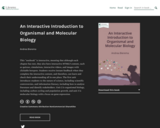
Short Description:
This "textbook" is interactive, meaning that although each chapter has text, they also have interactive HTML5 content, such as quizzes, simulations, interactive videos, and images with clickable hotspots. Students receive instant feedback when they complete the interactive content, and therefore, can learn and check their understanding all in one place. The first unit introduces students to the nature of science, including scientific controversies, and information literacy, including how to analyze literature and identify stakeholders. Unit 2 is organismal biology, including carbon cycling and population growth, and unit 3 is molecular biology with a focus on gene expression.
Long Description:
This “textbook” is interactive, meaning that although each chapter has text, they also have interactive HTML5 content, such as quizzes, simulations, interactive videos, and images with clickable hotspots. Students receive instant feedback when they complete the interactive content, and therefore, can learn and check their understanding all in one place. I still consider this textbook to be fairly text-heavy and will continue to make it even more interactive content!
The image on the cover represents the creation of this book. I pulled most of the content from open resources, modified them, added questions, and now offer them for you to use!
I chose the content to align with two courses that I teach: environmental and organismal applications and biomedical applications. Unit 1 introduces students to science, which both courses use. Unit 2 covers content necessary for understanding conservation implications (the underlying theme of the course is de-extinction), and Unit 3 focuses on proteins so that students can understand the implications of modifying DNA (the underlying theme is CRISPR).
Please use this book as you see fit for your classes. I look forward to hearing how to make this book even more useful in the future!
Word Count: 34749
(Note: This resource's metadata has been created automatically by reformatting and/or combining the information that the author initially provided as part of a bulk import process.)
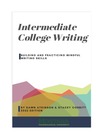
Intermediate College Writing: Building and Practicing Mindful Writing Skills is an open textbook designed for use in university‐level courses that focus on cultivating study skills alongside effective academic and workplace writing skills. It offers a no‐cost alternative to commercial products, combining practical guidance with interactive exercises and thoughtfully designed writing opportunities.
This textbook’s modular design and ample coverage of topics and genres means that it can be used flexibly over semester‐long or stretch courses, allowing instructors and students to select the chapters that are most relevant for their needs. By blending new material with reviews of key topics, such as academic integrity, the chapters provide fresh perspectives on matters vital to the development of strong writing skills. The book adapts, builds upon, and expands material covered in our first open textbook, Mindful Technical Writing: An Introduction to the Fundamentals (Atkinson & Corbitt, 2021).